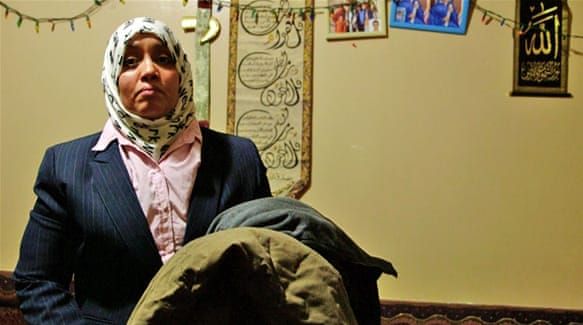New York City – Under dim lights in her apartment, Khulood Nasher clutched two winter coats, with the price tags still on, for her sons trapped in Yemen’s war. The last time she saw them, Omar was 13 and Rami 14 years old.
That was seven years ago.
“I’m not sure if maybe I’ll still be alive when I see them again,” Nasher said as her voice wavered. “I really give up.”
Years after applying to reunite with their mother, Rami and Omar had a visa interview at the US embassy in Djibouti last winter.
Nasher rushed to buy the coats to ensure that her sons didn’t catch a cold after they stepped off the plane in New York.
Two weeks later, President Donald Trump’s executive order banned citizens from seven Muslim-majority countries, including Yemen, and pushed for extreme vetting on visa applications.
A second ban in June blocked only those without a bona fide US relationship like a family tie, work contract or university admission.
The third version, targeting citizens from six of the original countries plus North Korea, Chad, and Venezuela, was temporarily blocked by a federal court in October.
But earlier this month, the US Supreme Court ruled to let the government enforce the most recent ban while lower courts debate its legality.
The White House maintains that the ban is intended to target countries that have not provided enough information to allow for the proper vetting of travellers, but rights groups say it disproportionately targets Muslims.
And while Nasher‘s sons – as the family members of a permanent resident who won asylum – do not fall under the travel ban, they still face extreme vetting procedures and lengthy delays under what legal experts and advocates have called a “ban beyond the ban”.
‘Life in Yemen is like hell’
Nasher still holds on to her sons’ coats, but her hope for them to join her in the US is ebbing.
“When you have kids who are suffering all the time, and you want to help these kids, how can you?” said Nasher, a legal permanent resident who won asylum in 2014.
“We have the right for our kids and family to join us, at least in this very bad situation. It’s a humanitarian disaster in Yemen.”
War has been raging between Yemen’s government, supported by a Saudi-led coalition, and Iranian-backed Houthi rebels since 2015.
The UN called the conflict the world’s worst humanitarian crisis.
Air raids have killed at least 10,000 people, mainly civilians, and famine threatens seven million more.
The fighting is everywhere. The bombs are everywhere. You do not feel safe. Wherever you go, you feel like you will be killed. There is no water, no gas, no nothing. The main sources of life don’t exist. We are very scared
Rami Haemd
“Life now is like a hell in Yemen,” Nasher‘s oldest son Rami said over the phone from Sanaa, Yemen’s capital, last month.
“The fighting is everywhere,” he told Al Jazeera.
“The bombs are everywhere. You do not feel safe. Wherever you go, you feel like you will be killed. There is no water, no gas, no nothing. The main sources of life don’t exist. We are very scared.”
Nasher said Rami has told her he doesn’t want to live any more and his younger brother, Omar, takes medication to sleep.
She said she suffers nightmares. She sees bombs in her sleep in her Bronx apartment and can only imagine what it’s like for her sons.
“This is life in Yemen,” Nasher said. “You’re running from death day-to-day.”
‘The silent Muslim ban’
On Sunday, more than 200 Yemenis in Djibouti received letters that their visas were denied, according to a dozen applicants who contacted immigration lawyer Julie Goldberg and Yemeni-American community activist Ibraham al-Qatabi.
The reason given was Trump’s proclamation, signed in September and put into force this month.
“This is completely, flat out discrimination,” al-Qatabi told Al Jazeera. “This is unconstitutional and immoral,” he added.
But for Nasher‘s sons, there is still a small bit of hope.
Their applications as of Monday remained in extra security screening called “administrative processing”.
The US Department of State says most cases under processing are resolved within 60 days, but families have been left waiting for months this year with no clear reason why or how to end it, according to a dozen immigration lawyers and community advocates.
They reported that after the first travel ban in January, Yemenis were pushed en masse into administrative processing.
“We feel like there’s a ban beyond this ban,” said Nasher.
Her son’s applications have been in “administrative processing” since November 8, 2016.
“I feel like all the Yemenis are suffering all over the world, they’re on hold for administrative processing.”
Nasher‘s lawyer, Julie Goldberg, said hundreds of her Yemeni clients have been stalled all year.
“When the first ban came into place, when it was lifted, it was lifted with this restriction,” Goldberg said.
“Under the new administration, it is mandatory that every single person goes into admin processing. While they were implementing the ban, they were doing this visa processing, and it’s very specific to Muslim countries.”
Her law firm is filing three class action lawsuits, with as many as 100 Yemeni plaintiffs each, to fight the delays that she and others say are targeted.
They (US authorities) work behind the scenes to block the ability of Yemeni families to unite and bring loved ones into the country
Albert Cahn, CAIR
“We have an array of practices that we refer to as the ‘silent Muslim ban’,” said Albert Cahn, legal director at the Council on American Islamic Relations (CAIR) in New York.
“They work behind the scenes to block the ability of Yemeni families to unite and bring loved ones into the country,” Cahn said.
According to the lawyers, tactics include prolonged investigations of applicants with no criminal background, extensive social media searches and requests for DNA to prove family relationships.
These can delay cases for months or even years.
Administrative processing is not unique to Yemenis or to Trump’s presidency.
There were nearly 200,000 cases under review last year, including 1,392 Yemenis, according to government data.
The largest group affected in 2016 were Chinese applicants, which reflects the size of the immigrant population.
Data by country is not yet available for this year, but lawyers report an increase in citizens from the banned countries under processing.
The spokesperson added that the need for administrative processing is based on each individual case, and consular officers can ask for more information if a red flag comes up in security screening.
But attorneys question why entire families, including children, are now under processing.
“Can you tell me why an 8-year-old child of a US citizen, who the second she lands, will become a US citizen, can you explain to me why that child needs to be in admin processing?” Goldberg said.
Nasher, who completed an American master’s degree in medical health physics, returned to the US in late 2010 on a tourist visa.
She was pregnant and accompanied by her seven-year-old son.
Rami and Omar, however, couldn’t come with her to New York.
When the Arab Spring erupted in Yemen three months later, Nasher sought asylum.
She won it four years later and immediately applied for her older sons to join her.
That was more than three years ago.
The government estimates the process will take six months, but attorneys said that Yemenis have faced long delays compared with other nationalities.
“There has always been extensive processing for persons from the Middle East, and they don’t tend to keep records or documents,” said Yolanda Rondon, a lawyer with the American Arab Anti-Discrimination Committee.
“It makes Yemenis in particular vulnerable.”
Lack of official documents
Yemen lacked government infrastructure even before the war, and official documents either didn’t exist or were suspected to be fake.
Nasher‘s sons’ file disappeared, and it took her a year and the help of a lawyer to find it.
Her lawyer Goldberg sued the US government to push them to assign an interview for her sons.
The young men braved the day-long, dangerous boat journey from Yemen to Djibouti for their appointment on November 1, 2016.
More than a year later, their case status online still says “under administrative processing”.
After eight months of waiting, Nasher‘s sons could no longer afford to live in Djibouti, where monthly rents run upwards of $1,000.
In July, they returned to Yemen. They now live in a relatives’ abandoned house in Sanaa, surrounded by war.
Nasher has tried everything to reunite with her sons.
She contacted the embassy of Djibouti, met New York legislators and shared her story for an Amnesty International report.
She said she’s spent tens of thousands of borrowed dollars in the process.
After three years of waiting, some of the friends and family who loaned her cash have started to ask for it back.


Recent Comments